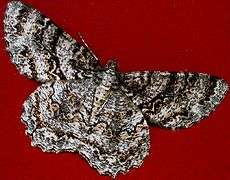Epimecis hortaria
| Tulip-tree beauty | |
|---|---|
 | |
| Scientific classification | |
| Kingdom: | Animalia |
| Phylum: | Arthropoda |
| Class: | Insecta |
| Order: | Lepidoptera |
| Family: | Geometridae |
| Genus: | Epimecis |
| Species: | E. hortaria |
| Binomial name | |
| Epimecis hortaria (Fabricius, 1794)[1] | |
Epimecis hortaria, the tulip-tree beauty, is a species of Ennominae found in North America. It is found throughout New England south to Florida and west to Texas and Missouri.[2] They can be seen flying from late March to early October. Adults are nocturnal and are attracted to lights.[3] The immature caterpillars can be found feeding on Magnolia, Asimina, Populus, Sassafras and Liriodendron.[4]
Identification
With a wingspan of 43–55 mm, E. hortaria is one of the larger Geometer moths.[5] There are two forms, one being "Dendraria" and the other being "Carbonaria". The Dendraria has a broader median with subterminal lines while the Carbonaria is darker with white edging.[3] The thick bodied caterpillar has a swollen 3rd thoracic segment. The caterpillar is grey to brown with darker markings, faint pinstripes and orange spiracles.[2]
References
- ↑ "Epimecis hortaria Fabricius 1794". Retrieved 2009-12-16.
- 1 2 Evans, Arthur V. (2007). Field Guide to Insects and Spiders of North America. Sterling Publishing Co., Inc. p. 320. ISBN 978-1-4027-4153-1.
- 1 2 "Species Epimecis hortaria – Tulip-tree Beauty – Hodges#6599". Retrieved 2009-12-16.
- ↑ "Epimecis hortaria". Retrieved 2009-12-16.
- ↑ "Species Detail Butterflies and Moths of North America". Retrieved 2009-12-16.